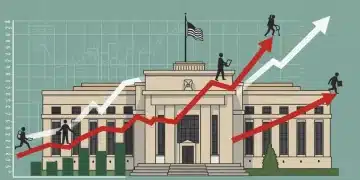Insights on defi loan platforms: unlocking new opportunities

Anúncios
DeFi loan platforms enable users to borrow and lend cryptocurrencies directly through decentralized networks, offering benefits like lower fees, accessibility, and transparency, while also presenting risks such as market volatility and smart contract vulnerabilities.
Insights on defi loan platforms can reveal exciting opportunities in decentralized finance. Have you ever considered how these platforms might transform your borrowing experience? Let’s dive into this innovative world and see what it offers.
Anúncios
What are defi loan platforms?
DeFi loan platforms are changing the way we think about borrowing and lending in the digital age. These platforms leverage blockchain technology to offer financial services that traditional banks typically provide, but in a decentralized manner. This means you can access loans without needing a banking intermediary.
Understanding DeFi Loan Platforms is quite simple. They connect borrowers and lenders directly through smart contracts. These contracts automatically enforce the terms of the loan, ensuring both parties adhere to the agreement without the need for third-party oversight.
Anúncios
Key Features of DeFi Loan Platforms
Some of the standout features of these platforms include:
- Decentralization: No central authority controls the lending process, allowing for more freedom and transparency.
- Accessibility: Anyone with internet access can participate, making financial services available globally.
- Variety of Assets: Users can use different cryptocurrencies as collateral, providing flexibility in loan options.
- Real-time Transactions: Loans are processed quickly, often within minutes, thanks to smart contracts.
In addition, DeFi loan platforms often offer competitive interest rates compared to traditional banks. This is due to the elimination of overhead costs associated with maintaining physical branch locations. Borrowers can find affordable rates that fit their needs while lenders can earn higher returns on their investments. However, it’s essential to be aware of the risks, such as smart contract vulnerabilities and market volatility.
As the DeFi ecosystem continues to evolve, you’ll find that these platforms are becoming increasingly sophisticated. New features are regularly introduced, enhancing user experience and security. This innovation is part of what makes DeFi loan platforms so appealing to tech-savvy borrowers and investors.
Benefits and Risks
It’s crucial to weigh the benefits and risks of using these platforms. Benefits include:
- Lower Fees: Reduced transaction fees compared to traditional lending.
- Higher Returns: Lenders can offer more competitive rates.
- Privacy: Borrowers can maintain their anonymity without sharing personal information.
On the other hand, potential risks involve:
- Market Risks: The value of collateral can fluctuate, leading to liquidations.
- Smart Contract Risks: Code vulnerabilities can lead to losses.
- Regulatory Changes: As governments react to DeFi, new regulations can impact operations.
By understanding the essentials of DeFi loan platforms, you can make informed decisions whether you’re borrowing or lending. Learning and adapting to these new financial tools will open doors to innovative opportunities in the financial landscape.
Benefits of using defi loan platforms

Using DeFi loan platforms has numerous advantages that can enhance your financial experience. These platforms provide quick access to funds and offer unique opportunities that are often not available through traditional banking systems.
One of the primary benefits is accessibility. Anyone with a digital wallet can use these platforms, regardless of their location. This opens up financial services to individuals who may be unbanked or underbanked, helping to connect a broader audience to the world of finance.
Lower Costs and Fees
Another significant advantage is lower costs. Traditional banks often charge high fees for loans, but DeFi platforms usually have much lower fees due to their decentralized nature. This reduction is mainly because there are no middlemen involved in the lending process.
- Reduced fees: Transaction and service fees are typically lower.
- Competitive interest rates: Borrowers can find better rates than traditional banks.
- Flexible terms: Users can often customize the terms of their loans.
Additionally, transparency is a hallmark of DeFi loan platforms. Every transaction is recorded on the blockchain, making it easy to track and verify. Borrowers and lenders can see everything happening in real time, giving them confidence in their transactions.
Opportunities for Lenders
DeFi loan platforms also provide exciting opportunities for lenders. Individuals can earn interest on their crypto holdings by lending them out. This creates a passive income stream that can be quite profitable. The flexibility in choosing the amount and duration of loans can help lenders maximize their earnings.
Moreover, these platforms often allow for collateralization using a variety of cryptocurrencies, which adds another layer of protection for lenders. If a borrower cannot repay, the collateral can be liquidated to recover the loan amount. This feature makes lending less risky compared to traditional methods.
Ultimately, the benefits of using DeFi loan platforms revolve around greater accessibility, lower costs, and enhanced transparency. As more users begin to explore these options, the landscape of borrowing and lending will continue to evolve dramatically.
Risks associated with defi loans
While DeFi loans offer many benefits, there are significant risks that users should be aware of. Understanding these risks is essential to making informed decisions when engaging with decentralized finance platforms. One major concern is the potential for smart contract vulnerabilities, which can lead to the loss of funds if the code has flaws or exploits.
Another issue is market volatility. The value of cryptocurrencies can change rapidly, and if the collateral used for a loan decreases significantly, it can trigger liquidations. This means that borrowers may lose their collateral if they cannot meet the required loan-to-value ratios.
Types of Risks
Identifying the different types of risks associated with DeFi loans can help users navigate this space with more confidence:
- Smart Contract Risks: Bugs or flaws in the smart contract code can be exploited by malicious actors.
- Regulatory Risks: As governments begin to scrutinize DeFi, new regulations may be enacted that affect how platforms operate.
- Liquidity Risks: In times of market stress, it may be harder to find buyers or sellers for assets, impacting your ability to exit a position.
Additionally, some platforms may have insufficient liquidity, which can lead to increased slippage during transactions. This means that the price at which you want to execute a trade may change significantly by the time the trade goes through.
Peer risk is another concern in the DeFi lending ecosystem. When interacting with other users, if they fail to repay their loans, it could create a chain reaction that affects other participants. Trust in the underlying technology and in other users is vital for a successful experience.
Moreover, securing your cryptocurrency assets is critical. Hacks and security breaches of platforms can result in substantial financial losses. Thus, choosing reputable platforms and employing robust security measures like two-factor authentication is crucial for mitigating these risks.
Grasping the risks associated with DeFi loans allows users to make better decisions and helps them prepare for potential challenges in this innovative financial landscape.
How to choose the right defi loan platform?

Choosing the right DeFi loan platform is crucial for a positive borrowing or lending experience. With many options available, it can be overwhelming to decide which platform meets your needs. Start by considering factors like security, reputation, and the features offered by each platform.
One key consideration is security. Look for platforms that have undergone external audits to ensure their smart contracts are safe from vulnerabilities. A history of successful security practices can indicate that a platform takes user protection seriously.
Reputation and Reviews
Taking the time to research a platform’s reputation is essential. Read user reviews and look for feedback on forums or social media to understand the experiences of others. A platform with positive testimonials is typically more trustworthy than one with consistent complaints.
- Check for audit reports: Reputable platforms will often share audit results with the public.
- Community engagement: Active participation in discussions can show commitment to user satisfaction.
- Partnerships: Established alliances with well-known entities may signal credibility.
Another aspect to explore is the features that each platform offers. Some platforms provide lower fees, while others may offer higher interest rates for lenders. Consider what is most important to you, whether it’s the cost of borrowing, the potential for earnings, or additional services such as yield farming or staking opportunities.
Ease of Use and Interface
The user interface and experience can also affect your choice. Select a platform that is simple to navigate, even if you’re new to DeFi. A well-designed platform will make it easier to manage your loans and assets without confusion.
A key feature to look for is customer support. Ideally, you want a platform that offers responsive customer service to assist you with any issues or questions. Whether through live chat, email, or a robust FAQ section, support can make a big difference in your overall experience.
Finally, always consider the platform’s liquidity. A platform with higher liquidity is less likely to experience issues when you want to execute trades or withdraw funds. Checking the liquidity pool’s performance can help you gauge the stability of your investment.
By considering all these factors, you can make a more informed decision about which DeFi loan platform to choose, enhancing your experience in the decentralized finance space.
In conclusion, understanding DeFi loan platforms is vital for anyone looking to explore decentralized finance. These platforms bring exciting opportunities, but also come with risks. By doing thorough research and considering factors like security, reputation, and functionality, you can make informed choices that align with your financial goals. Always prioritize using reputable platforms and understand the inherent risks involved to ensure a positive experience in this innovative financial space.
FAQ – Frequently Asked Questions about DeFi Loan Platforms
What are DeFi loan platforms?
DeFi loan platforms are decentralized financial services that allow users to borrow and lend cryptocurrencies without intermediaries.
What are the risks associated with DeFi loans?
Risks include smart contract vulnerabilities, market volatility, and liquidity issues which can lead to financial losses.
How do I choose the right DeFi loan platform?
Look for factors like security, reputation, user interface, and customer support to find the most suitable platform for your needs.
Can I earn money by lending my cryptocurrency on DeFi platforms?
Yes, you can earn interest on your cryptocurrency holdings by lending them on DeFi platforms, creating a potential passive income stream.





